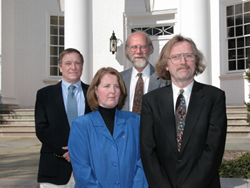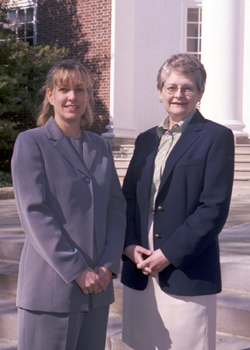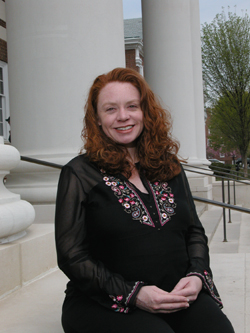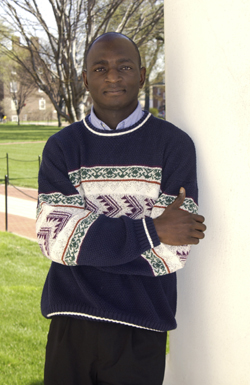3:30 p.m., May 9, 2003--Six University of Delaware faculty members received awards in recognition of their excellence in teaching and advising during the annual Honors Day celebration, held throughout the campus on May 9. Two teaching assistants also received awards for excellence.
The excellence-in-teaching awards, which were presented to four faculty members, are sponsored by the Christian R. and Mary F. Lindback Foundation and the University Alumni Association and are based primarily on student evaluations.
 |
Winners of the Excellence in Teaching Award are (front row) Lesa Griffiths, professor of animal and food sciences; and Lawrence Nees Jr., professor of art history and (Back row) James Scarborough, associate professor of bioresources engineering and Harris Ross, professor of English.
Photo by Duane Perry |
The excellence-in-advising awards presented to two faculty members, are given to emphasize the importance of academic advising, to recognize and reward excellent faculty advisers and to encourage faculty to devote more time and attention to becoming effective advisers.
Excellence-in-teaching awards were presented to Lesa Griffiths, professor of animal and food sciences; Lawrence Nees Jr., professor of art history; Harris Ross, associate professor of English and James Scarborough, associate professor of bioresources engineering.
Excellence-in-advising awards were presented to Connie Vickery, professor of nutrition and dietetics, and Stephanie Wolbert, instructor in education.
Winning awards for excellence-in-teaching as teaching assistants were Carol R. Gregory, sociology, and Adebanjo Oriade, physics and astronomy.
Lesa Griffiths
Griffiths has been a professor at the University of Delaware since 1986. She obtained her bachelor’s degree from Cornell University and her master’s and Ph.D. from Purdue University. All her degrees are in animal science.
She decided to become a professor after completing an undergraduate research project and senior thesis on animal nutrition. The research project had all kinds of animal-related problems to overcome and it was a real challenge, she said. The faculty member she worked with also helped influence her decision to become a professor.
Griffiths said she enjoys the tremendous opportunities to teach students in a variety of different learning environments.
For the last six years, she has been involved in administration, first in the dean’s office in the College of Agriculture and Natural Resources and now in the Center for International Studies. Although she has given up her official research appointment in animal nutrition, Griffiths continues to teach and participate in several research projects associated with using technology to enhance learning.
Her most memorable teaching moment is the rewarding look on her students’ faces every time they witness an animal birth. “The smiles, sighs, gasps and wide eyes tell me most students have never seen anything being born,” she said.
The biggest change she has seen while at the University is that the student body has embraced the atmosphere of discovery learning. In her department, the demand for undergraduate research, lab courses, on-farm management and study abroad keep increasing.
Lawrence Nees Jr.
Nees first came to the University of Delaware as an assistant professor in 1978. He obtained his bachelor’s degree with honors from the University of Chicago and his master’s and doctoral degrees from the Department of Fine Arts at Harvard University.
Always having a love for learning, he said he knew he always wanted to be a professor and describes his profession as being a very important part of his life.
Nees conducts research in the area of medieval art and has published four books and dozens of articles. He also has received grants and fellowships from the Guggenheim Foundation, the National Endowment for the Humanities, the American Council of Learned Societies, the American Philosophical Society, the Mellon Foundation, the Institute for Advanced Study at Princeton University, the Center of Advanced Study in the Visual Arts at the National Gallery of Art in Washington, D.C., and many others.
Harris Ross
Harris Ross began teaching at the University of Delaware in 1984. He received his Ph.D. from the University of Arkansas. Before coming to UD, he taught at a small Jesuit college in Alabama.
While growing up, Ross was uncertain about his career plans. He said he decided to become a college professor when a friend asked if he would be interested in a teaching job. Since, he said, he had no other plans and no skills except for the ability to analyze books and films, he accepted the offer.
Ross said the best part of his job is interacting with the students. “No matter how many times I’ve taught a certain course, every time I teach it, it feels like the first,” he explained. New students with different needs, keep the challenges of teaching fresh, he said.
His most memorable teaching moments happen when he sees his journalism students’ faces light up after their first story appears in print. He said he also enjoys making his classes as informal and enjoyable as possible. Throughout his years at UD, Harris said he has seen many students become more adventuresome in their tastes in books and movies than they were when he first came to the University.
 |
Stephanie Wolbert, instructor in the School of Education and Connie Vickering, professor of nutrition and dietetics.
Photo by Duane Perry |
Ross also conducts research in film and has just finished a book on early film censorship titled “Afraid of the Movies.”
James Scarborough
Scarborough will celebrate 20 years of teaching engineering at the University of Delaware in August. He received his bachelor’s degree in mechanical engineering and agriculture from the University of Delaware and earned his master’s and doctoral degrees in agricultural engineering from the University of Illinois. In graduate school, he enjoyed being a teaching assistant and decided to become a professor, Scarborough said.
He said he likes his job because he enjoys seeing his students learn the concepts he teaches in class and knowing that he has made a difference in their lives. He said he also enjoys hearing that a graduate has made a career in the field of engineering and knowing that he taught him or her something of importance.
The biggest change he has noticed in his years at UD is the increasing number of female students in engineering. He also says that more students are coming to college better prepared so they are able to move ahead more quickly in their college studies.
Connie Vickering
“A good adviser is someone who cares about students but doesn’t tell them what to do. It’s someone who lays out all of the options and doesn’t let them go down the path recklessly,” Vickering said.”The most challenging part of advising is getting students to realize that they really do need advising. Sometimes they think their roommate is their best adviser.”
As a departmental adviser to 25 students, Vickering also directs the dietetic internship program and helps all nutrition majors prepare for and apply for internships.
She said she takes a personal interest in her advisees. “Every semester I send them a note telling them it’s time to make an advising appointment,” she said. “I get on line and rattle their cages.”
The best part of advising, she said, is “helping a student discover just what they want to do and how to get there.”
Another rewarding part of advising is hearing from students after they have graduated, Vickering said. “Advising is a lifetime assignment for me. The first time I see them I tell them they’re stuck—I’m their adviser fo
 |
Carol Gregory
Photo by Duane Perry |
r life!”
Stephanie Wolbert
Wolbert has been at the University of Delaware for three years. She is currently the coordinator of the Vertical Model of Field Experience and advises approximately 50 students ranging from freshmen to seniors. She also teaches student training seminars and elementary/middle school curriculum science.
Wolbert earned her bachelor’s degree in elementary education from Clarion University and her master’s of instruction from UD in 2000.
She defines an adviser as someone who is willing to lend an ear and truly listen to the concerns and needs of students. She said she feels the most challenging part of her job is putting aside her own stress so that she is able to give her best to her students. She said the most rewarding part as being an adviser is seeing the success that her students achieve and the wonderful teachers that they become.
Carol Gregory
On maternity leave with a new baby boy, Gregory is concluding her dissertation on the success of community correctional programs. She has been a teaching assistant for four years and also taught her own class for three of the four. She said the best thing about being a teaching assistant is getting to know the students and becoming part of their lives.
“I love to watch them grown intellectually, watch them sort things out and learn to think critically,” she said. “The second best thing is seeing them later as upperclassmen or graduates and finding out how they are doing.”
This fall, Gregory will take a new position in the justice studies program of Kent State University.
 |
Adebanjo Oriade
Photo by Kathy Atkinson |
Adebanjo Oriade
Oriade has been a teaching assistant at UD since the 2001 spring semester and has been at the University since August 2000. He holds a bachelor’s degree in physics and is pursuing his Ph.D. in physics, focusing on theoretical condensed matter.
Oriade said he decided to become a teaching assistant when he began working toward his doctorate and being a TA came as part of that package. He said the best part of his job is when he can share a good laugh with his class and when his students appreciate physics. For the future, he plans to conduct research and teach.
Article by Amy Pasternack, AS 2003

